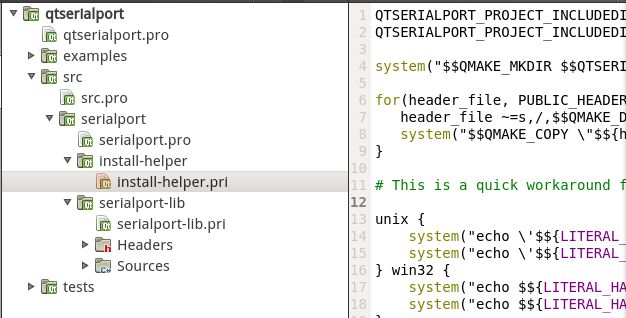Qt中的串口编程之三
QtSerialPort今天我们来介绍一下QtSerialPort模块的源代码,学习一下该可移植的串口编程库是怎么实现的。
首先,我们下载好了源代码之后,使用QtCreator打开整个工程,可以看到如下图的源代码结构:
我们先来看一下serialport-lib.pri这个文件,serialport.pro工程文件就是靠这个文件来控制整个源代码的编译的。,具体内容如下:
上面的内容只是最基本的类,大家知道,跨平台的类一般在底层都包含这与操作系统相关的一些实现,这里也不例外,大家看看下面的图就明白了,
这里只以类unix操作系统为例来做说明:
也许看到这个大家不是很明白:
这与qmake的一些特性相关:CONFIG、DEFINE、PKGCONFIG都是qmake私有的一些变量,而packagesExist()则是qmake私有的函数,
整个这一块要表达的意思是"如果udev这个库存在,则编译程序的时候就定义HAVE_LIBUDEV这个宏定义(在我们的代码中使用了这个宏定义),
并且链接程序的时候,也链接udev这个库"。至于qmake的一些特性以及使用方法,后续会专门写几篇博文详细介绍。
至于udev这个库的介绍,请见:libudev
我们在代码中是如下使用udev库的:
在serialport源代码中还是用了另外一个开源库,那就是lockdev,该库主要提供的功能就是“Lockdev is a setgid binary,
which provides a reliable way to put an exclusive lock in /var/lock to devices (e.g. ttyS0) using both FSSTND and SVr4 methods,
so regular users don't need write access there.”
下面,看看我们在代码中是如何使用lockdev的:
对于lockdev,我们在下一篇博客中将详细介绍它的功能的和实现。
好了,言归正传,我们来看看serialport库在类unix操作系统上是如何实现的:
头文件:
与平台无关的公共头文件:qserialportglobal.h qserialport.h qserialportinfo.h
与平台无关的私有头文件:qserialport_p.h qserialportinfo_p.h
与平台有关的头文件: qttylocker_unix_p.h qserialport_unix_p.h
源文件:
与平台无关的源文件:qserialport.cpp qserialportinfo.cpp
与平台有关的源文件:qttylocker_unix.cpp qserialport_unix.cpp qserialportinfo_unix.cpp
源代码解析:
1、QSerialPort类源码解析
(1)QSerialPort类继承自QIODevice,包含对串口的基本操作:
与该类有关系的类主要是如下几个:
QIODevice、QSerialPort、QSerialPortPrivate、QSerialPortPrivateData。
它们的关系如下:
QSerialPort继承自QIODevice,继承了对设备文件基本的操作。
QSerialPortPrivate是QSerialPort对象中表示操作一类的,该部分与操作系统有关。QSerialPortvate继承自QSerialPortPrivateData。
QSerialPortPrivateData是一个串口设备的初始化数据,例如波特率等等。
QSerialPortPrivateData更多表示串口设备的初始数据,QSerialPortPrivate更多表示平台相关的对串口设备的操作。
(2)QSerialPort类定义:
class QSerialPortInfo;
class QSerialPortPrivate;
class Q_SERIALPORT_EXPORT QSerialPort : public QIODevice
{
Q_OBJECT
Q_PROPERTY(qint32 baudRate READ baudRate WRITE setBaudRate NOTIFY baudRateChanged)
Q_PROPERTY(DataBits dataBits READ dataBits WRITE setDataBits NOTIFY dataBitsChanged)
Q_PROPERTY(Parity parity READ parity WRITE setParity NOTIFY parityChanged)
Q_PROPERTY(StopBits stopBits READ stopBits WRITE setStopBits NOTIFY stopBitsChanged)
Q_PROPERTY(FlowControl flowControl READ flowControl WRITE setFlowControl NOTIFY flowControlChanged)
Q_PROPERTY(DataErrorPolicy dataErrorPolicy READ dataErrorPolicy WRITE setDataErrorPolicy NOTIFY dataErrorPolicyChanged)
Q_PROPERTY(bool dataTerminalReady READ isDataTerminalReady WRITE setDataTerminalReady NOTIFY dataTerminalReadyChanged)
Q_PROPERTY(bool requestToSend READ isRequestToSend WRITE setRequestToSend NOTIFY requestToSendChanged)
Q_PROPERTY(SerialPortError error READ error RESET clearError NOTIFY error)
Q_PROPERTY(bool settingsRestoredOnClose READ settingsRestoredOnClose WRITE setSettingsRestoredOnClose NOTIFY settingsRestoredOnCloseChanged)
Q_ENUMS( Directions Rate DataBits Parity StopBits FlowControl PinoutSignals DataErrorPolicy SerialPortError )
public:
enum Direction {
Input = 1,
Output = 2,
AllDirections = Input | Output
};
Q_DECLARE_FLAGS(Directions, Direction)
enum BaudRate {
Baud1200 = 1200,
Baud2400 = 2400,
Baud4800 = 4800,
Baud9600 = 9600,
Baud19200 = 19200,
Baud38400 = 38400,
Baud57600 = 57600,
Baud115200 = 115200,
UnknownBaud = -1
};
enum DataBits {
Data5 = 5,
Data6 = 6,
Data7 = 7,
Data8 = 8,
UnknownDataBits = -1
};
enum Parity {
NoParity = 0,
EvenParity = 2,
OddParity = 3,
SpaceParity = 4,
MarkParity = 5,
UnknownParity = -1
};
enum StopBits {
OneStop = 1,
OneAndHalfStop = 3,
TwoStop = 2,
UnknownStopBits = -1
};
enum FlowControl {
NoFlowControl,
HardwareControl,
SoftwareControl,
UnknownFlowControl = -1
};
enum PinoutSignal {
NoSignal = 0x00,
TransmittedDataSignal = 0x01,
ReceivedDataSignal = 0x02,
DataTerminalReadySignal = 0x04,
DataCarrierDetectSignal = 0x08,
DataSetReadySignal = 0x10,
RingIndicatorSignal = 0x20,
RequestToSendSignal = 0x40,
ClearToSendSignal = 0x80,
SecondaryTransmittedDataSignal = 0x100,
SecondaryReceivedDataSignal = 0x200
};
Q_DECLARE_FLAGS(PinoutSignals, PinoutSignal)
enum DataErrorPolicy {
SkipPolicy,
PassZeroPolicy,
IgnorePolicy,
StopReceivingPolicy,
UnknownPolicy = -1
};
enum SerialPortError {
NoError,
DeviceNotFoundError,
PermissionError,
OpenError,
ParityError,
FramingError,
BreakConditionError,
WriteError,
ReadError,
ResourceError,
UnsupportedOperationError,
UnknownError
};
explicit QSerialPort(QObject *parent = 0);
explicit QSerialPort(const QString &name, QObject *parent = 0);
explicit QSerialPort(const QSerialPortInfo &info, QObject *parent = 0);
virtual ~QSerialPort();
void setPortName(const QString &name);
QString portName() const;
void setPort(const QSerialPortInfo &info);
bool open(OpenMode mode) Q_DECL_OVERRIDE;
void close() Q_DECL_OVERRIDE;
void setSettingsRestoredOnClose(bool restore);
bool settingsRestoredOnClose() const;
bool setBaudRate(qint32 baudRate, Directions dir = AllDirections);
qint32 baudRate(Directions dir = AllDirections) const;
bool setDataBits(DataBits dataBits);
DataBits dataBits() const;
bool setParity(Parity parity);
Parity parity() const;
bool setStopBits(StopBits stopBits);
StopBits stopBits() const;
bool setFlowControl(FlowControl flow);
FlowControl flowControl() const;
bool setDataTerminalReady(bool set);
bool isDataTerminalReady();
bool setRequestToSend(bool set);
bool isRequestToSend();
PinoutSignals pinoutSignals();
bool flush();
bool clear(Directions dir = AllDirections);
bool atEnd() const Q_DECL_OVERRIDE;
bool setDataErrorPolicy(DataErrorPolicy policy = IgnorePolicy);
DataErrorPolicy dataErrorPolicy() const;
SerialPortError error() const;
void clearError();
qint64 readBufferSize() const;
void setReadBufferSize(qint64 size);
bool isSequential() const Q_DECL_OVERRIDE;
qint64 bytesAvailable() const Q_DECL_OVERRIDE;
qint64 bytesToWrite() const Q_DECL_OVERRIDE;
bool canReadLine() const Q_DECL_OVERRIDE;
bool waitForReadyRead(int msecs) Q_DECL_OVERRIDE;
bool waitForBytesWritten(int msecs) Q_DECL_OVERRIDE;
bool sendBreak(int duration = 0);
bool setBreakEnabled(bool set = true);
Q_SIGNALS:
void baudRateChanged(qint32 baudRate, QSerialPort::Directions dir);
void dataBitsChanged(QSerialPort::DataBits dataBits);
void parityChanged(QSerialPort::Parity parity);
void stopBitsChanged(QSerialPort::StopBits stopBits);
void flowControlChanged(QSerialPort::FlowControl flow);
void dataErrorPolicyChanged(QSerialPort::DataErrorPolicy policy);
void dataTerminalReadyChanged(bool set);
void requestToSendChanged(bool set);
void error(QSerialPort::SerialPortError serialPortError);
void settingsRestoredOnCloseChanged(bool restore);
protected:
qint64 readData(char *data, qint64 maxSize) Q_DECL_OVERRIDE;
qint64 readLineData(char *data, qint64 maxSize) Q_DECL_OVERRIDE;
qint64 writeData(const char *data, qint64 maxSize) Q_DECL_OVERRIDE;
private:
void setError(QSerialPort::SerialPortError error, const QString &errorString = QString());
QSerialPortPrivate * const d_ptr;
Q_DECLARE_PRIVATE(QSerialPort)
Q_DISABLE_COPY(QSerialPort)
};
Q_DECLARE_OPERATORS_FOR_FLAGS(QSerialPort::Directions)
Q_DECLARE_OPERATORS_FOR_FLAGS(QSerialPort::PinoutSignals)2、QserialPortInfo类源码解析
(1)QserialPortInfo主要是枚举系统上可用串口设备的信息:
与该类的类主要是如下几个:
QSerialPort、QSerialPortInfo、QSerialPortInfoPrivate、QSerialPortInfoPrivateDeleter。
QSerialPortInfo的构造函数中使用到了QSerialPort。
QSerialPortInfoPrivate则代表QSerialPortInfo的私有数据。
(2)QserialPortInfo类定义:
class QSerialPort;
class QSerialPortInfoPrivate;
class QSerialPortInfoPrivateDeleter;
class Q_SERIALPORT_EXPORT QSerialPortInfo
{
Q_DECLARE_PRIVATE(QSerialPortInfo)
public:
QSerialPortInfo();
explicit QSerialPortInfo(const QSerialPort &port);
explicit QSerialPortInfo(const QString &name);
QSerialPortInfo(const QSerialPortInfo &other);
~QSerialPortInfo();
QSerialPortInfo& operator=(const QSerialPortInfo &other);
void swap(QSerialPortInfo &other);
QString portName() const;
QString systemLocation() const;
QString description() const;
QString manufacturer() const;
quint16 vendorIdentifier() const;
quint16 productIdentifier() const;
bool hasVendorIdentifier() const;
bool hasProductIdentifier() const;
bool isNull() const;
bool isBusy() const;
bool isValid() const;
static QList standardBaudRates();
static QList availablePorts();
private:
QScopedPointer d_ptr;
};
inline bool QSerialPortInfo::isNull() const
{ return !d_ptr; }
附录:
1、qtserialport源代码中使用了D指针,Q指针,这方面的介绍请见Qt之美(一):d指针/p指针详解





